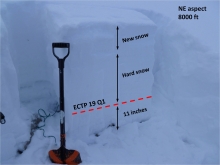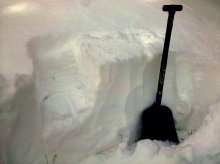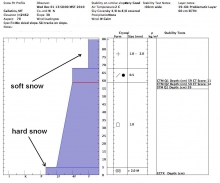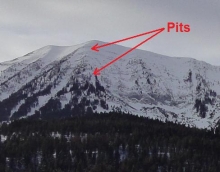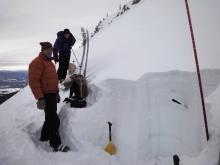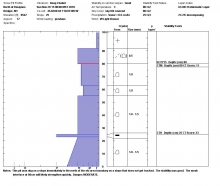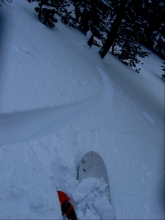Advisory Archive
Yesterday morning an additional 2-3 inches of snow fell. The storm ended and clear skies came overnight with single digit temperatures this morning. Winds calmed to 5-10 mph from the WSW with a few gusts near 20 mph. As another storm passes south of the advisory area, the mountains near West Yellowstone will have mostly cloudy skies while the mountains near Bozeman will have mostly sunny skies. Temperatures will warm into the low 20s F and winds will remain calm.
By 6 a.m this morning, the mountains near Cooke City had received 17 inches of snow, the Bridger Range and mountains near West Yellowstone received 7-10 inches, and the Madison and Gallatin Ranges received 4-5 inches. Temperatures were in the low 20s F with winds blowing 10-30 mph mostly from the west. Snowfall will continue this morning with another 2-3 inches. As cold air descends from the north, temperatures will drop into the teens F by this afternoon with the Bridger Range being the first to receive this cold air. Winds will decrease somewhat and blow 10-20 mph slowly shifting from the W to NW.
Yesterday morning most areas received about 1 inch of new snow but more is coming tonight. This morning temperatures were hovering near 20 degrees F with winds blowing 10-20 mph from the WSW. Temperatures today will climb into the high 20s F and winds will increase this afternoon to 20-40 mph from the SW. Snow should start slowly around midday with the heaviest snowfall occurring late this evening. The southern mountains near West Yellowstone and Cooke City will receive 7-9 inches of snow while the mountains near Big Sky and Bozeman will receive 5-7 inches.
A trace to one inch of snow fell last night with temperatures in the teens in the north and single digits down south. Westerly winds have been steady at 15-25 mph and will continue throughout today. Moist air pushing in from the Pacific will keep skies cloudy and provide limited snow showers. For the next 24-hour period I’m expecting a trace to one inch of new snow. Mountain temperatures should rise into the high teens with westerly winds.
Clear skies allowed the temperatures to drop into the single digits this morning. There’s no new snow to report and ridgetop winds have been blowing west to southwest at 15-30 mph. Today will cloud up as moisture streams in from the Pacific; however I’m only expecting a teaser of snow by tomorrow morning with flurries that might add up to an inch in the southern mountains. Temperatures should warm to the teens today as winds remain westerly at 20-30 mph.
A weak storm system has moved over southwest Montana bringing light precipitation to much of our forecast area. The mountains around West Yellowstone picked up 3 inches overnight while the rest of our advisory area picked up a trace to one inch. Currently, winds are light out of the W-SW at 5-15 mph and temperatures are in the high teens to low twenties F. Today, scattered snow showers will remain over southwest Montana delivering an additional 1-2 inches of snow. Winds will stay light out of the W-SW and daytime temperatures will climb into the low thirties F. A ridge of high pressure will build tonight into tomorrow bringing southwest Montana cooler and drier conditions.
Over the past 24 hours a brief ridge of high pressure brought southwest Montana clearing skies and warmer temperatures. Yesterday, mountain temperatures climbed into the mid to high twenties F under mostly sunny skies and winds were blowing out of the W at 15-25 mph. Currently, mountain temperatures are in the mid teens to low twenties F and ridgetop winds are blowing out of the W at 20-30 mph with the Hyalite weather station recording gusts close to 50 mph.
Today, the ridge high pressure will begin to break down as the next wave of pacific moisture pushes in from the west. This will produce cloudy skies with an increasing chance of precipitation this afternoon. Temperatures will stay mild with highs reaching the upper twenties F and winds will increase out of the W blowing 20-40 with gusts up to 50 mph. We can expect light precipitation to begin this evening, with a better chance of snow tomorrow. The southern mountains should see 2-4 inches by tomorrow night with 4-6 inches falling in the north.Today will be a good one to get outside after yesterday’s feast. Overnight, temperatures warmed into the low teens F and will reach 20 degrees F today under a mix of some sun and clouds. Winds were blowing 15-30 mph from the W in most areas except in the Bridger Range where winds were blowing 40 mph yesterday and 30 mph this morning. Today, ridgetop winds will continue blowing 15-30 mph from the W. Over the past 2 days 3-5 inches of low density snow has fallen, and late this evening a few snowflakes should fall but not accumulate.
Burrrr! The coldest temperatures of the season have moved into southwest Montana turning off all precipitation. Not to worry though – this latest storm delivered over two feet of snow to the mountains around West Yellowstone, 15-18 inches to the mountains around Cooke City and 6-8 inches to the northern Gallatin and Madison Ranges. The Bridgers received a total of 2-4 inches. The latest storm is being pushed out by an arctic blast that is descending from Canada.
Currently mountain temperatures are sitting between ten and twenty below zero and winds are blowing out of the W-NW at 15-20 mph with gusts up to 30 mph. Mountain temperatures will struggle to climb above zero today and winds will increase out of W-NW reaching a consistent 20-30 mph by this afternoon. High clouds will remain over our area for the remainder of the day, but no precipitation is expected. Temperatures will gradually start to increase by Friday.

